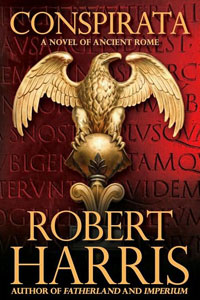When in Rome

British novelist Robert Harris’s (Imperium) second installment in his trilogy of the late Roman Republic, Conspirata: A Novel of Ancient Rome (Simon & Schuster), begins when Cicero becomes Consul of Rome, a position which he achieved at the end of the first installment of this fictional history. As he is about to be inaugurated, a dead slave boy is discovered, cruelly disfigured in an apparent ritual killing. This crime sets into motion Cicero’s struggle to prevent a conspiracy from destroying the republic by the populists and patricians who revile him (and plot his assassination). This historically accurate tale of political infighting and treachery, set between 63 and 58 BC (when Cicero is forced into exile), is once again recounted by Cicero’s slave and private secretary, Tiro, who is a lively storyteller and reliable reporter.
One of my favorite readers and book commentators Katherine Powers, who suggested this book to me, observes:
Hindsight, foreshadowing, and, indeed, resonance with our own time, pervade the book. This, like the previous volume, is a fascinating treatment of brute politics, confounded civic virtue, and now, increasingly, demagoguery and the “Dionysian convulsions” of the masses. The Roman Republic is on its last legs; with its constitution stretched and tattered, governance is a dirty business—a necessarily dirty business—for Rome’s citizens are not, as Cicero writes to his friend Atticus, “living in Plato’s Republic,” but in “Romulus’s shit hole.”
Ms. Powers concludes:
“I wonder,” Harris has Cicero say elsewhere, “what men will think of us a thousand years from now… We have so much—our arts and learning, laws, treasure, slaves, the beauty of Italy, dominion over the entire earth—and yet why is it that some ineradicable impulse of the human mind always impels us to foul our own nest?” The answer here, nearly two thousand years on, is that when we think of Rome we think of our dismal, unraveling future. Still, that takes nothing away from the pleasure to be had from these witty, briskly written, historically rich novels.
